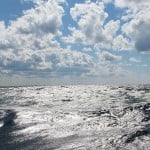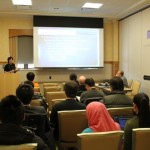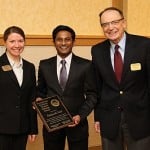The Mechanical Engineering-Engineering Mechanics Department is
a partner with the Keweenaw Research Center for the SAE Clean Snowmobile Challenge held at Michigan Tech.
 World Water Day Events at MTU: March 20, 26-27, 2014
World Water Day Events at MTU: March 20, 26-27, 2014
More information
March 20: Gasland Film (7:00 pm)
March 26: WWD Poster Session (3:30-7:00pm)
Informal research discussions with students (4:00-5:00 pm)
WWD Lecture: Dr. Robert Howarth (5:30pm)
Open reception (6:30)
Railroad Night offered a relaxed dine-with-industry setting for faculty, students, industry, administration and community to meet each other and to learn more about railroads and the railroad industry. The event included hors d’oeuvres , cash bar, door prizes, and more. This event continues to draw in record numbers of participants with each year with over 165 this year. The Keynote Speaker was Lisa Stabler, President of the Transportation Technology Center Inc., Pueblo, Colorado.
 by Dennis Walikainen, senior editor
by Dennis Walikainen, senior editor
It’s a chance for Michigan Tech graduate students to shine. The Graduate Research Colloquium, slated for Wednesday and Thursday, Feb. 19 and 20, showcases the work of current grad students, as they present their findings to judges and visitors alike.
The event coincides with the University’s Career Fair, held Tuesday, Feb. 18 and the timing is great, according to Jackie Huntoon, associate provost and dean of the Graduate School.
 The Society of Women Engineers (SWE) section at Michigan Tech hosted the 2014 Region H SWE Conference on Michigan Tech’s campus Feb. 14 to 16. There were approximately 700 in attendance.
The Society of Women Engineers (SWE) section at Michigan Tech hosted the 2014 Region H SWE Conference on Michigan Tech’s campus Feb. 14 to 16. There were approximately 700 in attendance.
The conference drew members from nine Midwestern states. Three quarters of registered attendees are collegiate section members, with the rest coming from professional sections.
The c onference activities included: A networking lunch with industry professionals, a Career Fair with companies looking to recruit female employees, and a keynote speech by Patricia K Poppe, the vice president of customer experience and operations for Consumers Energy and a banquet speech by Martha Sullivan, the president and CEO of Sensata Technologies.
Photo Gallery of Events at the Society of Women Engineers Conference at Michigan Tech
National Engineers Week celebrates the positive contributions engineers make to society and is a catalyst for outreach across the country to kids and adults alike. For the past 60 years, National Engineers Week (Eweek) has been celebrated each February around the time of George Washington’s birthday, February 22, because Washington is considered by many to be the first engineer in the US. Each year the national celebration grows, and this year Michigan Tech will jump head first into Eweek with a dozen different engineering events on campus for all to enjoy.
 The Global Talent Retention Initiative of Michigan (GTRI) is a talent retention and career development resource for employers and international students in Michigan.
The Global Talent Retention Initiative of Michigan (GTRI) is a talent retention and career development resource for employers and international students in Michigan.
Michigan Governor Rick Snyder says that “Immigants have a tremendous track record of being entrepreneurs. This is a way to turbocharge our economy.”
Registration is now open for Design Expo 2014 (formerly Undergraduate Expo) at http://www.expo.mtu.edu
The registration deadline for all Senior Design and Enterprise Teams is Friday, February 14, 2014
Please also mark your calendars for Design Expo 2014 (formerly Undergraduate Expo)
Thursday, April 17, 2014; 8 AM – 4 PM; J. Robert Van Pelt and John and Ruanne Opie Library, 3rd floor



